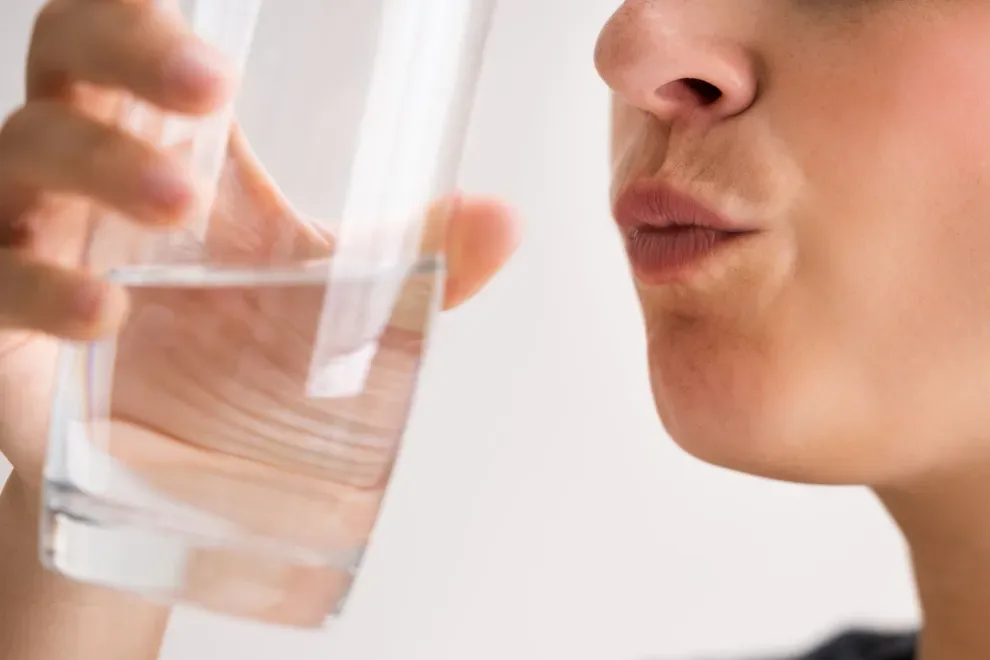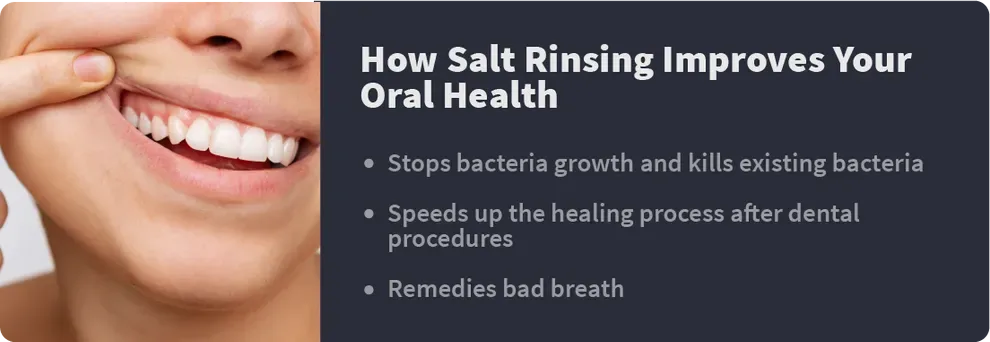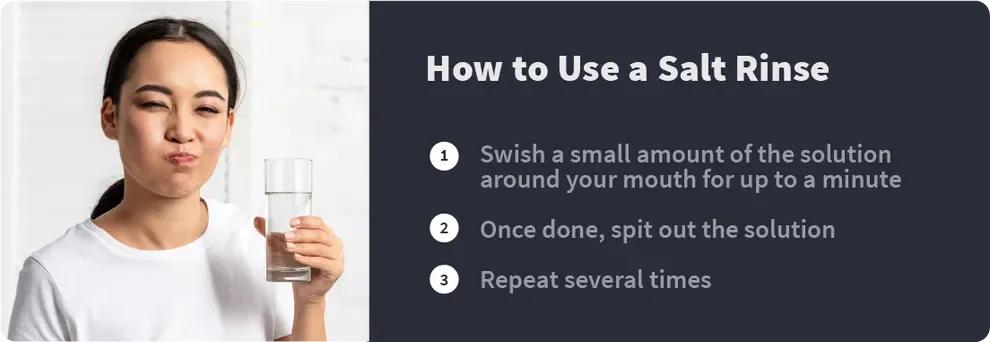How Salt-Water Rinses Can Improve Your Oral Health

Table of Contents
- What Is a Salt Rinse?
- How Does Salt Rinsing Improve Oral Hygiene
- How to Use a Saline Solution
- How to Make a Salt Water Rinse
- Resources
Salt is one of the most fascinating and pivotal elements of human existence. It is a mineral that helped establish numerous civilizations across the globe, and over time various cultures found unique uses for it that helped their communities flourish.
Human use of salt dates back to 6,000 BCE, and all notable societies found different ways to utilize it. Egyptians used it as medicine. Greeks used it to preserve food. And today, salt pervades almost every society, with the most affluent cultures creating numerous varieties for personal and commercial use.
One of the most common uses is for is dental care.

As a component of oral hygiene, salt can be used to relieve pain-stricken gums, sore throats, canker sores and other cuts and blemishes inside the mouth.
If you’ve ever had a tooth extraction, the dentist likely advised you to rinse with warm salty water for a few days.
A salt-water rinse carries myriad benefits and can help your improve and maintain excellent dental hygiene. Just what is a salt rinse, how should you use it, and how does it cleanse your mouth?
What Is a Salt Rinse?
Salt rinse, also known as a saline rinse or a saline solution, is a simple mix of salt and water. This solution effectively kills mouth bacteria, treats canker sores, and guards your mouth against common infections. Salt rinses can also alleviate toothaches and improve your breath.
While commercial oral health solutions like mouthwash are effective, they can be expensive and inaccessible to some. A salt rinse is not only cheap and easy to make, but it also provides the same benefits as a mouthwash.
Mouthwash contains high levels of alcohol which can sometimes irritate the mouth and gums, making saline solutions a healthy and effective alternative.
How Does Salt Rinsing Improve Your Oral Hygiene?
Saline solutions have various benefits to your mouth, teeth, and gums. Some of the benefits of regular salt rinsing include:
The mouth, in general, is a breeding ground for bacteria. These bacteria can lead to tooth decay, gum disease, and other oral health complications when left unchecked. Food and sugar particles stuck between and around your teeth provide an excellent environment for the bacteria to thrive.
Mouth rinsing raises the pH level in your mouth. The result is a more alkaline environment that does not support bacteria growth. As a result, any existing bacteria will die off, and there’ll be a significant reduction in further bacteria growth and development.
After a dental procedure, your dentist will likely advise salt rinsing for several days. This is because saline solutions speed up recovery in the mouth. Salt rinses promote gingival fibroblast migration while also increasing extracellular matrix component amounts.
Basically, this isotonic solution contains valuable salts in minerals that allow faster regeneration of damaged cells. This is why salt has also been used throughout history in the treatment of external wounds.
In most cases, the bacteria found in your mouth can result in bad breath. When you salt rinse, you kill most of these bacteria, leaving you with a cleaner and fresher breath. Additionally, swishing saline solution removes any stuck food particles that could also cause foul breath.
Ultimately, salt rinsing is a simple, affordable, and highly effective oral hygiene solution. You can use saline solutions if you have a toothache, just had a dental procedure, want to get rid of bad breath, or generally want to have a cleaner mouth and teeth.
However, it is important to note that salt rinsing is not an alternative to other oral care practices. While rinsing with salt water will benefit you, that does not make up for a lack of brushing your teeth or flossing regularly. You should continue those highly recommended daily routines.

How Do You Use a Saline Solution?
To use a salt rinse properly, drink a small amount of the solution and swish it around your mouth for up to a minute. Ensure you reach every part of the mouth for maximum results. Once done, spit out the solution and repeat it several times.
Make sure to spit out the solution once done. While there’s no direct harm, salt can be dehydrating, and continually ingesting salt can be bad for your health.
The best time to use a salt rinse is after you’re done brushing and flossing. Unless directed otherwise by a dental care specialist, you should use the saline solution twice a day. If you’re using the solution to alleviate toothache, you can use it up to four times a day for a limited time.
It’s important not to overuse salt rinse as too much sodium can negatively affect your teeth and gums. For instance, overusing saline solutions may erode the enamel. If you’re uncertain how many times you can safely use the solution, you can consult with your dental care specialist.
How to Make a Salt Water Rinse
To make the perfect saline solution, boil a glass of water and leave it to cool until warm. When the water is warm, add half a teaspoon of salt and stir until the salt dissolves. When possible, you can also add half a teaspoon of baking soda and continually stir until everything dissolves. Once completed, you’ll have ready to use salt rinse.
In addition to their disinfectant properties, you can use salt-water rinses to treat other oral concerns, such as canker sores, allergies, and toothaches.
Resources
Efficacy of a Rinse Containing Sea Salt and Lysoyme on Biofilm and Gingival Health in a Group of Young Adults: A Pilot Study. National Center of Biotechnology Information. Date fetched: August 30, 2021.
Comparative evaluation of salt water rinse with chlorhexidine against oral microbes: A school-based randomized controlled trial. Journal of Indian Society of Pedodontics and Preventive Dentistry. Date fetched: August 30, 2021.
Halitosis: From diagnosis to treatment. Journal of Natural Science, Biology and Medicine. Date fetched: August 30, 2021.
Advice after dental extractions: Information for patients. Oxford University Hospitals. Date fetched: August 30, 2021.
